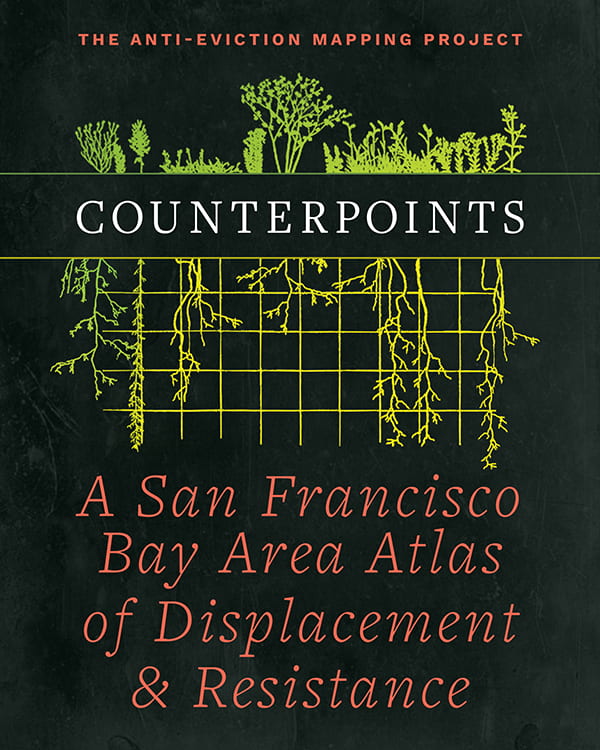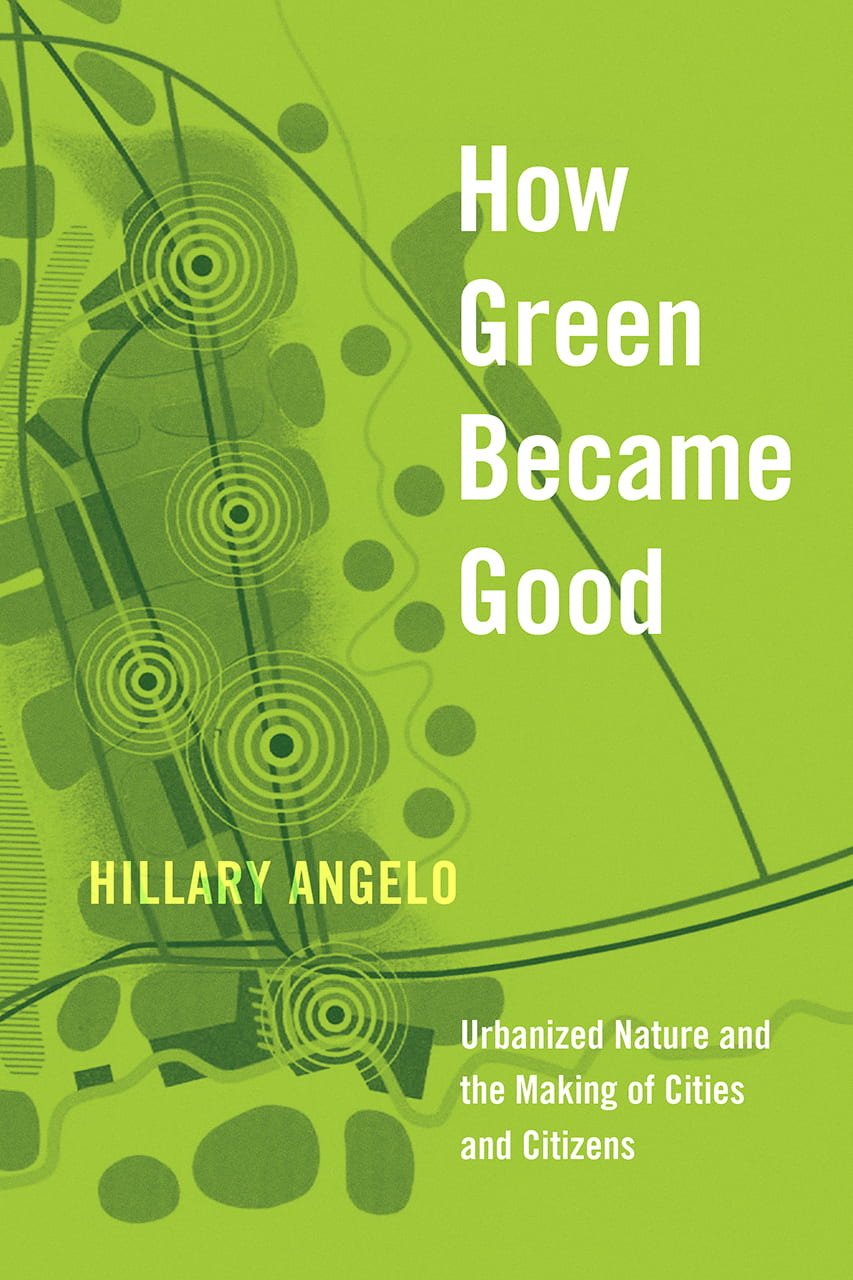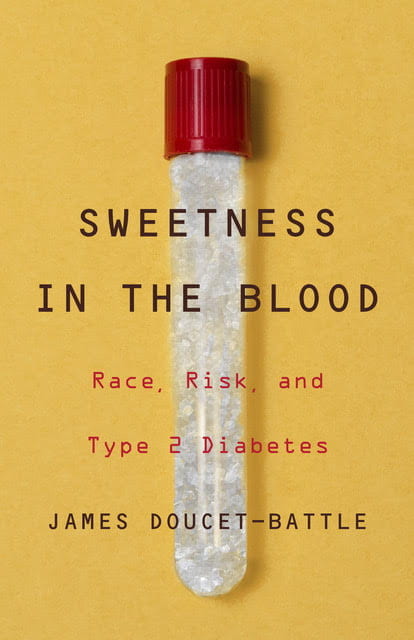A recording can be found on YouTube.

Book cover for Counterpoints: A San Francisco Bay Area Atlas of Displacement and Resistance (PM Press)
Counterpoints: A San Francisco Bay Area Atlas of Displacement and Resistance (PM Press, forthcoming) brings together cartography, essays, illustrations, poetry, and more in order to depict gentrification and resistance struggles from across the San Francisco Bay Area and act as a roadmap to counter-hegemonic knowledge making and activism.
Learn More about Counterpoints.
About the Anti-Eviction Mapping Project
The Anti-Eviction Mapping Project (AEMP) is a data visualization, critical cartography, and multimedia storytelling collective that documents displacement and resistance struggles on gentrifying landscapes. With chapters in the San Francisco Bay Area, New York City, and Los Angeles, the collective works with numerous community partners and housing justice networks in order to provide data, maps, stories, and tools for resisting displacement. AEMP has produced hundreds of maps, oral histories, and multimedia pieces, as well as dozens of community events and reports, and numerous academic and public facing articles, book chapters, and murals. AEMP’s work has been presented in a variety of venues, from art galleries and collectives to neighborhood block parties, from academic colloquia and conferences to community workshops and book fairs.
Erin McElroy is a postdoctoral researcher at New York University’s AI Now Institute, researching the digital platforms and technologies used by landlords in order to surveil, evict, and racialize tenants. Erin is cofounder of the Anti-Eviction Mapping Project and coeditor of its forthcoming atlas, Counterpoints: A San Francisco Bay Area Atlas of Displacement and Resistance. Having earned a doctoral degree in Feminist Studies from the University of California, Santa Cruz with a focus on the politics of space, race, and technology in and between postsocialist Romania and post-Cold War Silicon Valley, Erin is invested in transnational analyses and international solidarity organizing for housing, racial, and technological justice. To this end, Erin is a founding editor of the Radical Housing Journal, an open access transdisciplinary journal supporting the work of housing justice globally.
Adrienne Hall is a PhD student in Geography at the University of North Carolina at Chapel Hill. She earned her master’s degree in public health at San Francisco State University. Adrienne has been with the Anti-Eviction Mapping Project since 2016, and she is a co-editor of the Health and Environmental Justice chapter of the Atlas.
Campus Contributors:
The Science & Justice Research Center’s Just Biomedicine research cluster, overseen by Sociology Professor Jenny Reardon with Katherine Weatherford Darling (University of Maine), contributed a chapter titled: ‘Just Biomedicine on Third Street? Health and Wealth Inequities in San Francisco’s Biotech Hub.’ This chapter examines the different visions for health and healthcare that have been imagined and practiced along the Third Street corridor. At the north end stands Mission Bay, a newly revitalized neighborhood centered around UCSF’s biomedical campus and a biotechnology ecosystem. Just three miles south along Third Street, however, stands Bayview-Hunters Point, which remains one of the city’s most marginalized communities, home to a disproportionate disease burden and struggling public health clinics. This project brings into view for public discussion the effects of the resulting financial and ideological investments in an imagined “future of medicine,” and how they are changing the political landscapes, built environments, and health of Bay Area residents right now.
Undergraduate and Graduate Student Researchers and Alumni: Wessede Barrett (Politics), Dennis Browe (Sociology), Emily Caramelli (Sociology Politics), Amy Coffin (Neuroscience, Philosophy), Hannah Finegold (Biology, Law & Society), Laura Lopez, Emma Mitchell-Sparke (Tufts University), Andy Murray (Sociology), Nikobi Petronelli (Feminist Studies).
The Transportation, Infrastructure, and Economy contribution by Kristin Miller (Sociology).
Kristin Miller is a PhD Candidate in Sociology at UC Santa Cruz with a Designated Emphasis in Film & Digital Media, and has an MA in Media, Culture, and Communication from NYU. Her research concerns the role of Silicon Valley futurism in reshaping the Bay Area, and she studies cities, environmentalism, and technology, with interests in science-fiction film and TV, and Utopian Studies.
The No Place Like Home project overseen by Sociology Professors Steve McKay and Miriam Greenberg contributed a visual summary and map from their large-scale study of the affordable housing crisis for Santa Cruz County tenants. The map helps amplify how the uneven geography and demography of the county is reflected in (and by) inequalities on critical issues such as rent burden, over-crowding, and forced moves and evictions. The survey results also provide a springboard for the study’s wider discussion of local and regional policy options in addressing the housing crisis, particularly for renters.
Hosted by:
University Relations
Co-Sponsored by:
The Science & Justice Research Center, The UC Santa Cruz Institute for Social Transformation, The Humanities Institute, the Genomics Institute, and departments of Sociology and Feminist Studies.


